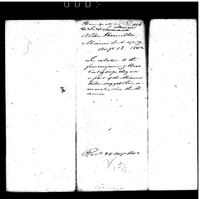Office of Indian Affairs Roll 418
Item set
Title
Office of Indian Affairs Roll 418
Language
English
Digital Publisher
National Archives and Records Administration
Description
Microfilm scans of Roll 418: Letters Received by the Office of Indian Affairs, 1824-81 at the National Archives. Miami Agency Emigration, 1842-1853.
Spatial Coverage
Washington D.C.
Items
-
Letter from Joseph Sinclear to William Medill, March 5 1846
Sinclear has received his appointment as agent of the Miami removal.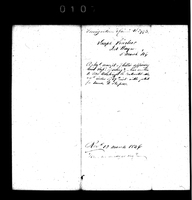
-
Letter from Robert Peebles to William Medill, February 27 1846
Peebles reports that he has purchased the removal contract from Dowling and plans to go to Fort Wayne and execute in spring of 1846.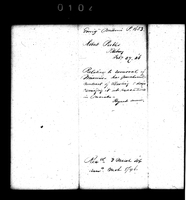
-
Letter from J. Hart to William Medill, December 13 1846
Ewing wants Medill to know that the Miamis began their trek on October 1.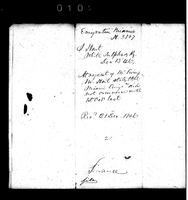
-
Letter from John Havity to William Medill, October 13, 1846
This is the clerk of the St. Louis office reporting that the Miamis just left St. Louis last evening on the steamer Clermont for Kanzas Landing.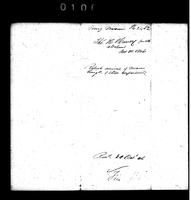
-
U.S. House of Representatives resolution on removal contract, February 21 1846
The House wants all information regarding the Miami removal contract, including if it has been sold or transferred, and whether or not the Miamis have been deported.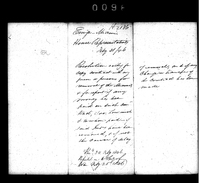
-
Letter from Graham N. Fitch to William Medill, August 25 1846
Fitch is relaying a message from Miami people regarding Coquillard and perhaps another agent. They want all of their debts settled by the government before removal. They believe their agent is misleading them about debts.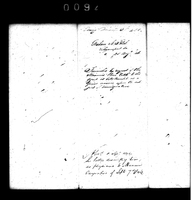
-
Letter from Graham Fitch to William Medill, August 3 1846
Fitch has heard the government is threatening the Miamis to emigrate, and he hopes that is not true. He asserts that justice demands that the Miamis not be threatened by force, but afforded justice.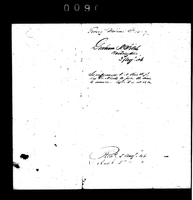
-
Letter from George W. Ewing to William Medill?, November 24 1846
Ewing wants to clarify information. First, he says it is false that three white men reported the Kansas reservation to be poor land. Instead, he insists that the Miami delegation who scouted west in 1845 themselves said the reservation in Kansas was poor land. Second, he argues against rumors that he opposed the swift Miami removal. Instead, he asserts it was in his interest as contract owner to quickly remove the Miamis.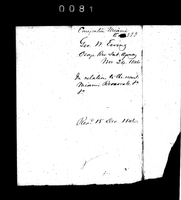
-
Summary of letter from J. Ellsworth to William Medill, December 11 1846
The letter is not here, but this summary states that it will be difficult to gather all creditors related to Myaamia debts.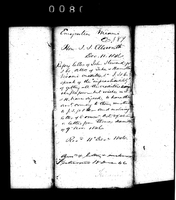
-
Letter from W.G. Ewing and G.W. Ewing to William Medill, October 13, 1846
The previous day (Oct. 12th) the Miamis left on the Colorado steamship, and will reach St. Louis by the 17th, Westport by the 25th, and their new homes by the 30th of October. The sick had mostly improved in health, and the contractor Mr. Alexis Coquillard will arrange meals for them in St. Louis. Coquillard and Sam Edsall, (brother in law of J. Sinclear, the superintendent of the removal contract) have money liabilities of $25,000 for the execution, but may not be used for personal services. Ewing went to Peru on the 1st of October and assisted Mr. Jouett and Mr. Coquillard in gathering indians and moving them to Cincinnati. Mr. Coquillard left with ample funds to execute the contract. There was trouble with these transactions, the letter discusses these disputes. These affairs were confirmed by the president on March 5th 1846.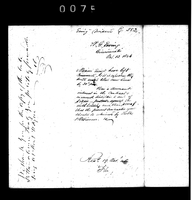
-
Letter from George W. Ewing to William Medill, March 12 1846
Ewing wants Medill to not pay Miami annuities to anyone until they emigrate West. He also includes a note not to forget paying him a $12,500 yearly installment before paying Miami annuities.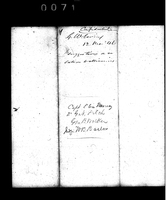
-
Letter from Thomas Dowling to William Medill, March 12 1846
Dowling approves the appointment of Sinclear as the agent in charge of Miami emmigration, and that he hopes to move the Miamis in May.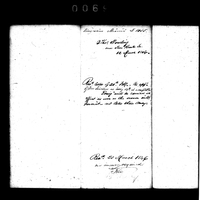
-
Letter from Charles Cathcart to William Medill, October 10 1846
The letter requests a copy of a report from Mr. Sinclear that detailed the difficulties of the Miami removal. They also request a copy of a statement of Mr. Samuel Edsall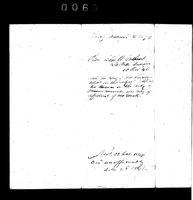
-
Letter from Charles Cathcart to William Medill, October 10 1846
If Dr. Fitch has been removed from his position as physician for Miamis, He recommends Dr. Norman Eddy, a qualified gentelman in nothern Indiana.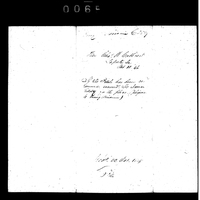
-
Julian Benoit and Allen Hamilton to William Medill, August 31 1846
Benoit and Hamilton speak strongly against using force to deport the Miamis.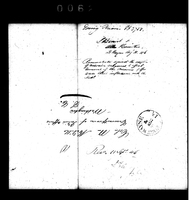
-
Letter from John McCalla to William Medill, December 17 1846
McCalla is a U.S. auditor who is asking for Dowling's removal contract.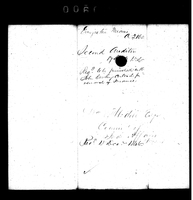
-
Letter from Adjutant General to William Jouett, October 10 1846
This letter was made to allow Jouett to recruit military olunteers to help remove the Miami people. Also includes the opportunity to offer the volunteers positions in the U.S. military forces.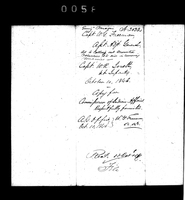
-
Letter from Roger Jones to John Erving, September 11 1846
The letter is written on Jouett's behalf about the removal of the Miami people under treaty guidelines and to ask for a military party from Newport KY to come to Fort Wayne to assist Captain Jouett.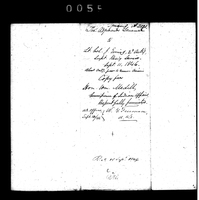
-
Letter from Francis Lafontaine to Joseph Sinclear, November 29 1845
Lafontaine asks Sinclear to lobby for his extended family to stay in Indiana.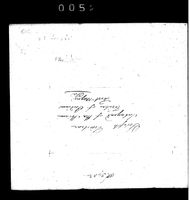
-
Letter from Joseph Sinclear to William Medill, December 29 1845
Sinclear encloses a letter from Francis Lafontaine, who asks for his extended family to stay in Indiana.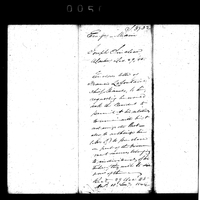
-
Letter from William Wilkins to T. Hartley Crawford, May 4 1844
Wilkins, Secretary of War, wants to work for the settlers/politicians of Indiana to remove the Miamis. Dowling's contract guarantees removal plus one year of subsistence for $55,000, and Wilkins authorizes Crawford to accept the contract, apparently on terms proposed by Dowling.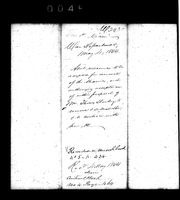
-
Letter from C. B. Smith to T. Hartley Crawford, December 26 1844
Smith represents the surety on a bond for Dowling's removal contract. Smith asks in the case Dowling transfers his contract, would the bond still be in force?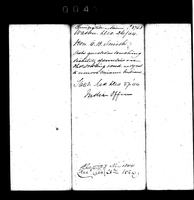
-
Memo from William Wilkins, December 6 1844
Wilkins authorizes Crawford to direct Hamilton re: removal.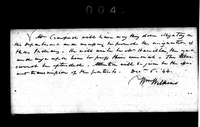
-
Letter from Allen Hamilton to T. Hartley Crawford, November 28 1844
Hamilton is working to convince the Miamis to migrate, but Dowling may have been too optimistic. Miamis still have property and annuity payments. Hamilton has received word that Dowling sold the contract.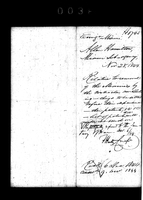
-
Letter from Allen Hamilton to T. Hartley Crawford, June 10 1844
Newspaper reports and traders are meddling in removal. Dowling attempted to assure the Miamis that they would be taken care of well. The Miamis will not commit to removal.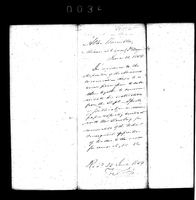
-
Letter from Huntington [?] to T. Hartley Crawford, May 22 1844
A banker is forwarding a bond on Dowling's removal contract.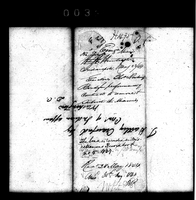
-
Letter from Allen Hamilton to T. Hartley Crawford, May 8 1844
Hamilton believes that he, and Miami leaders, can effect a removal. He wants instructions on whether to speak with the Miamis as a whole group or just their leaders.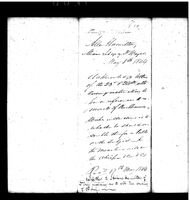
-
Letter from Allen Hamilton to T. Hartley Crawford, July 8 1844
Hamilton visited Coesse (Kouassee) and has chosen a reserve for him guaranteed in the 1838 treaty and would like a patent for Kouassee.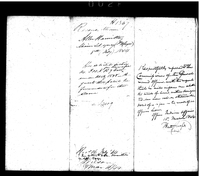
-
Letter from Thomas Dowling to T. Hartley Crawford, October 17 1844
Dowling has visited "the Indian country' twice, and in September met Hamilton, how has been important. Dowling thinks their removal will be a great thing for the Miamis. Dowling is optimistic of a springtime 1845 removal.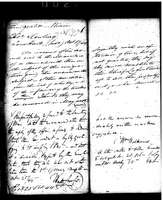
-
Letter from Thomas Dowling to Secretary of War William Wilkins, 1844
Dowling (in Terre Haute) is letting Wilkins know he has talked to a Mr. Crawford and suggests requiring the payment of the next annuity to be west of the Mississippi River to avoid influence of the Traders. He will also be suggesting this to A. Hamilton (in Fort Wayne) who he is expecting a letter from soon.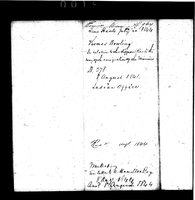
-
Letter and enclosure from Thomas Dowling to T. Hartley Crawford, June 5 1844.
Dowling met with Allen Hamilton, Miami agent at Fort Wayne, and supports Hamilton as an agent and supporter of Miami removal. The letter also contained a copy of a letter from Dowling to Hamilton.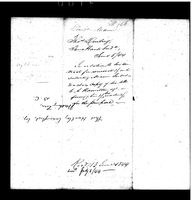
-
Letter from John McKee to John Porter, July 12 1843
McKee wants to be employed as a commissary for the removal of the Miamis.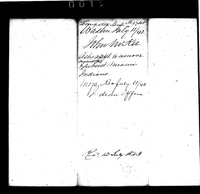
-
Letter from Thomas H. Blake to T. Hartley Crawford, June 14 1842
The Miami Tribe have five years to leave their lands from the 1840 treaty. The writer also instructs officers to survey the lands acquired by the U.S. in the 1840 treaty, the residue of the Great Miami Reserve, to enter into U.S. public lands.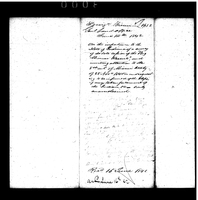
-
Indenture between Allen Hamilton and unknown, date unknown
Contract for Allen Hamilton to remove the Wea tribe from their native lands.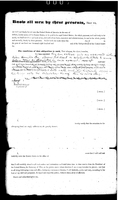
-
Indenture between Allen Hamilton and unknown, date unknown
A lot of relevant information is missing but it is about the removal of the Wea tribe from their native lands.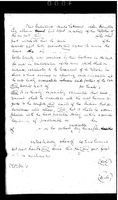
-
Letter from Allen Hamilton to T. Hartley Crawford, August 15 1842
Hamilton recommends the removal of Wea families from the Wabash, who are undoubtedly ethnically Miami.